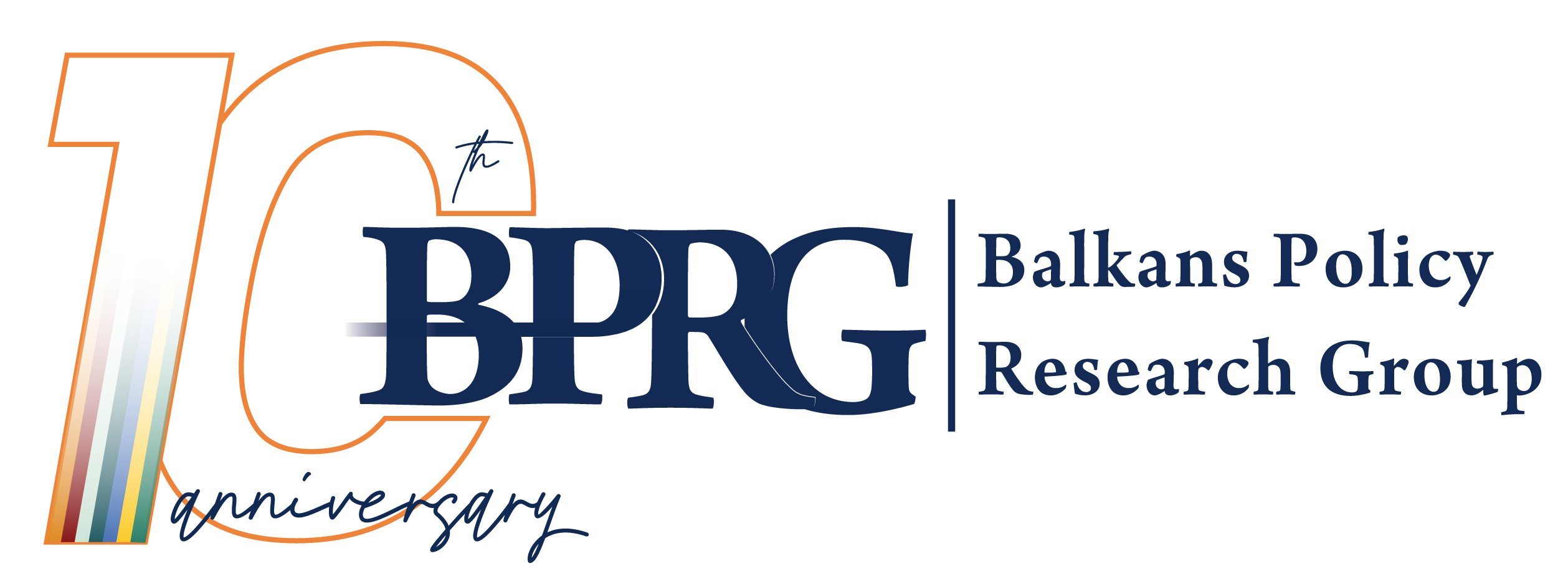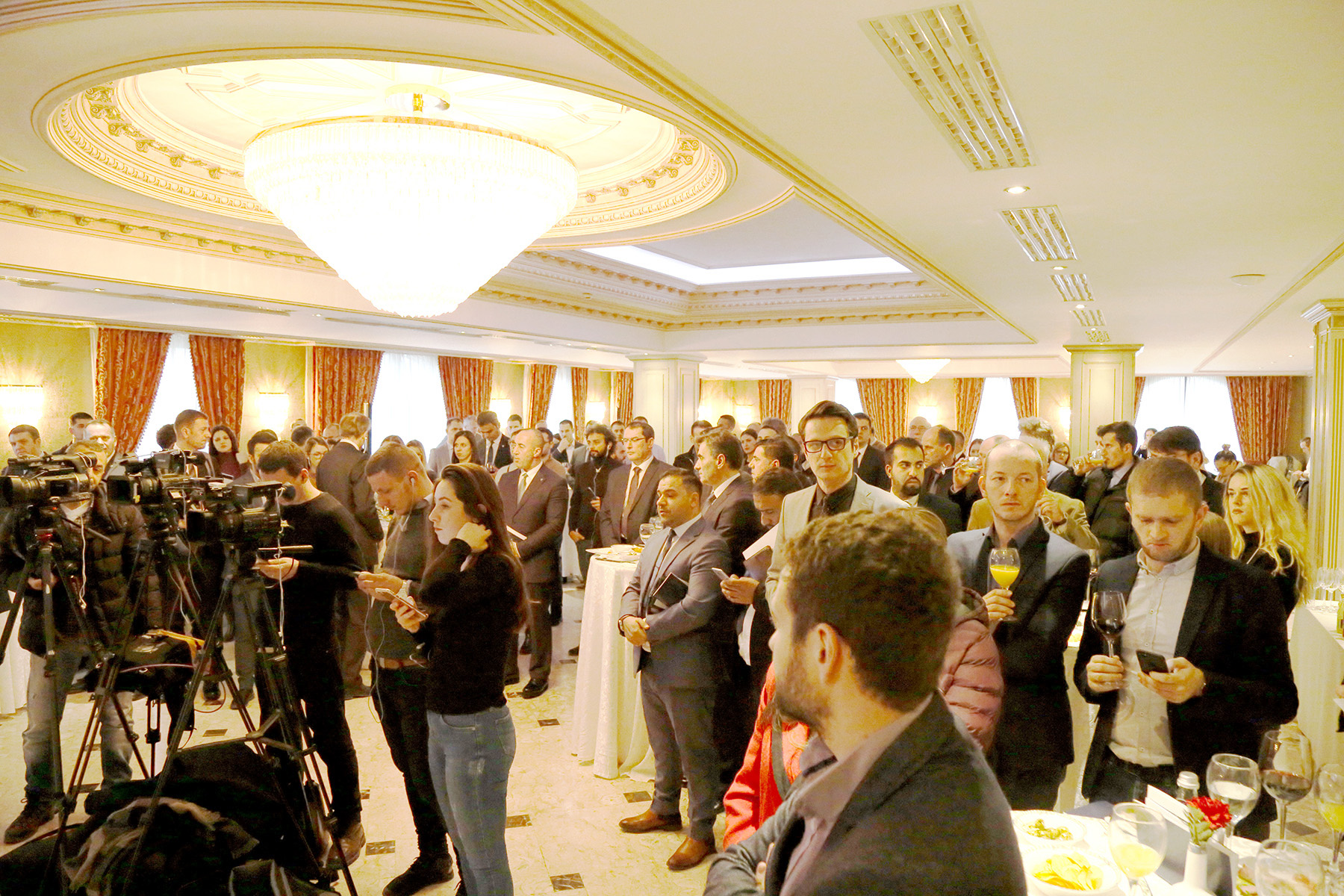23 January 2019 – Balkans Policy Research Group (BPRG) launched a new project “Advancing Kosovo’s Institutions, Democratisation & Regional Cooperation” financed by The Norwegian Ministry of Foreign Affairs. The two-year project targets a broad range of stakeholders who can affect change, such as civil society, governments, political parties and media. The launch event was a great opportunity for public and private actors alike, to gain a better understanding of the project’s main objectives and societal importance.
The project aims to advance the European agenda for Kosovo through strengthening of institutions, democratization and regional cooperation with participation at all levels of society. Its two year mandate seeks to ensure the broad involvement of stakeholders that can influence social change such as the government, political parties, civil society and the media.
The event also offered stakeholders a comprehensive outline of BPRG’s strategic approach and programatic agenda. Given its mission, BPRG is committed to continuously revising its methodology to reflect the most recent developments that impact Kosovo’s pursuit of Institution Building & Democratic Consolidation, Regional Cooperation & Good Neighborly Relations and EU Integration & Policy Change.
The launch event hosted members of parliament, branches of government, civil society, experts, academia, donors, ambassador and diplomats. The Ambassador of Norway Per Strand Sjaastad, Prime Minister Ramush Haradinaj, Democratic League of Kosovo (LDK) Vice President Lutfi Haziri presented their remarks and thoughts on the relevance of the project and the role of inclusive policy-making with the aim of ensuring further democratic consolidation of Kosovo.
Naim Rashiti presented and spoke about the relevance of the project, as well as the pivotal support of the Norwegian government. He noted that “for some years now, BPRG has been working with institutions in several areas, the main activities being related to political activity, in particular the reform on the European agenda. We have worked to support the dialogue with Serbia, and the European agenda. Today we launch a new program with the help of the Norwegian Embassy. Our contribution is complementary to the development of these agendas. The Government of Norway has given great support to the Balkans Group to fulfill its mission in the various areas of the program. During this project we will closley cooperate with all institutions and actors”.
Ambassador of Norway, Per Strand Sjaastad used this opportunity to address key challenges in Kosovo’s contemporary democratic consolidation and the role of the project in tackling existing shortcomings. Through outlining various key elements such as “accountable and trustful leaders, inclusion of women and youth in decision-making, the efficient striking of deals, consensus among political parties and long-term and lasting reforms”, Ambassador Sjaastad noted that “the risk of failing to offer stability and progress to ordinary citizens is much bigger if these basic principles are not met”.
In addition, Ambassador Stjaastad expressed his support for the work of the Balkans Group throughout the partnership. He noted “the Balkans Group plays an important role in promoting progress and developments in Kosovo to the benefit of all. The Balkans Group takes a broad and holistic approach to dialogue as well through facilitating dialogue meetings, trainings, research documents, the Balkans group is able to offer advice to key policy-makers”.
“I am very pleased that the project launched here today by the Balkans Group, will deal with all the aforementioned principles” and as such “the new project outlined here through the support of Norway is about strengthening institutions, democratization, dialogue and regional cooperation”, concluded Ambassador Stjaastad.
Prime Minister Ramush Haradinaj too, stressed the importance of the project in the context of Kosovo’s most pressing issues. As he argued, “this project that has been launched today, I believe has its own significance, because, given the dynamics of national goals, we often miss the most important elements that are imperative to our lives such as, the creation of a resilient platform through dialogue between partners, political parties, other actors and society as a whole”.
In addition the Prime Minister took note of the role of the Balkans Group in the promotion of the domestic dialogue. As such, the Prime Minister established that “the Balkans Group has worked to bring different political actors and party leaders onto the negotiating table to promote an internal dialogue between us and our society”.
The Prime Minister highlighted the importance of focusing on the implementation agenda, noting that “while Kosovo has many challenges, it is true that there has been considerable stagnation in implementation”. However, through working together as we have gathered here today, with the help of Norway and this project, I believe that we can move toward more effective and efficient implementation” concluded Prime Minister Haradinaj.
Likewise, Lutfi Haziri, expressed his gratitude for the work of the Balkans Group by saying that “throughout the last year the Balkans Group has worked continuously to bring political leaders together to address gaps in internal dialogue which is central to consensus building not only for our institutions and our leaders, but our society as a whole”.
Mr. Haziri urged for more cooperation among actors in promoting vital national policies and agendas. In discussing the importance of common platforms, Mr. Haziri noted that “we as beneficiaries of the Balkans Group project, need to use this opportunity to cooperate until we have addressed all important issues for us as actors and the country”. “We need to agree on a list of priorities and agendas that require us to work together”, concluded LDK Vice-President Haziri.
The project “Advancing Kosovo’s Institutions, Democratisation & Regional Cooperation” plays a crucial role in tackling some of Kosovo’s most pressing issues. By addressing existing gaps in contemporary democratic governance and Kosovo’s EU reform agenda, the project seeks to build on a culture of inclusive policy-making that reflects international standards.
The new programme has five components:
1. Foster dialogue and consensus of political parties and encourage inclusion of women, minorities, youth and civil society;
2. Educate and train future political leaders through bespoke courses on politics, public policy, governance and cooperation;
3. Promote and Support Dialogue on Normalisation of Relations between Kosovo and Serbia
4. Enhance bilateral relations between Kosovo and Bosnia and Herzegovina in the context of regional cooperation;
5. Enhance checks and balances and improve the functioning of institutions
Activities encourage and promote participation from women, ethnic minorities and youth to fully empower decision making processes. Some activities will be implemented with the partnership of the Institute for Policy Analysis, I4PA.
Below you can find media report links:
https://bit.ly/2WfyDUT – Telegrafi
https://bit.ly/2Dt4RVw – Gazeta Express
https://bit.ly/2FK5lJe – Klan Kosova
https://bit.ly/2UdsIhA – RTK
https://bit.ly/2CDxb5O – TV21
https://bit.ly/2FUwSa7 – Lajmi.net
https://bit.ly/2R99ac5 – IndeksOnline
https://bit.ly/2Wd3u4B – Ballkani.info
https://bit.ly/2R7jiC7 – KosovaLive360
https://bit.ly/2ASZzkr – KosovaPress
https://bit.ly/2HuTJva – BotaSot
https://bit.ly/2CJk5nw – Anadolu Agency Tirane

